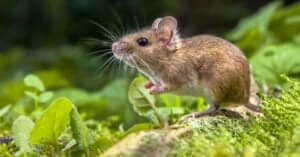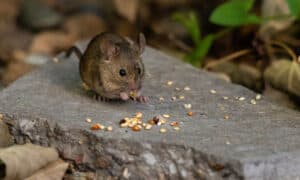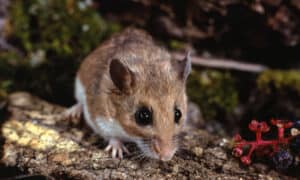You may have seen videos online of guinea pigs desperately paddling in the water, sometimes going in circles. They don’t sink and certainly know how to swim but should you put them into kiddy pools and watch them stress out just to see if they’re good at swimming? Obviously, no. Below, we explain why it’s not a good idea to let your guinea pig swim and we provide you with six tips to ensure your guinea pig can enjoy a safe and comfortable life alongside you as a beloved pet!
Are Guinea Pigs Good Swimmers?
Yes, guinea pigs can technically swim! But just because guinea pigs may be good at something doesn’t mean that they should be doing it. If they’re in a position where they have to swim, they follow through. But it’s not like they’re excited to dive into the water and enjoy the activity the way humans do. Not only is it an activity on the no-thank-you list for guinea pigs, but it’s dangerous as well!
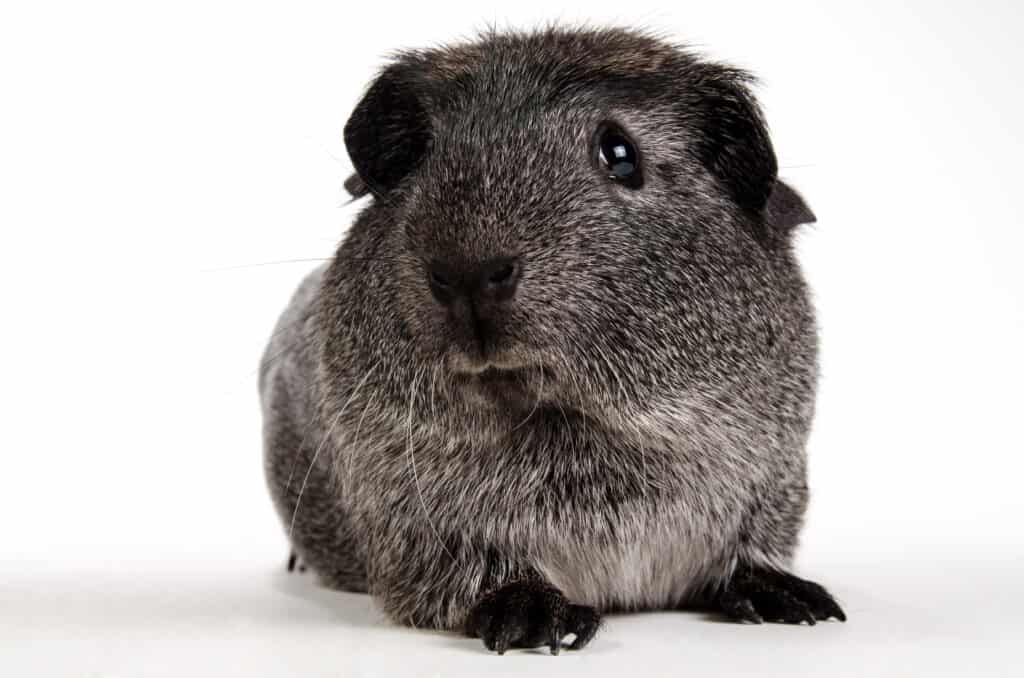
Guinea pigs can swim, but it is a stressful and dangerous activity for them.
©Chorch/Shutterstock.com
The dangers of swimming for guinea pigs include:
- Pneumonia
- Stress
- Ear infections
- Skin irritation
- Exhaustion
In the wild, guinea pigs settle into underground burrows, far from bodies of water. However, they have strong survival instincts and if they’re caught in a situation when swimming is necessary (escaping from a predator, for example), they jump in and swim their little hearts out to get to dry land as soon as possible.
6 Ways to Keep Your Guinea Pig Safe
1. Secure Your Guinea Pig’s Home
Your guinea pig’s living area has to be suitable. This means that it’s roomy enough for them to move about freely and tall enough for them to stand on their hind legs. When indoors, they need a well-ventilated environment that’s both dry and placed somewhere safe, away from heat sources (including sunny windows).
Even if you have central heat, it’s important to consider where the vents are. They need a shelter where they can settle in to feel safe. They also need space to exercise. If outdoors, the same rules apply, except be extra mindful of bedding and of securing the hutch so they can’t escape (especially if you have a pool).
2. Maintain Cleanliness
To keep your guinea pig safe and content, you need to clean their homes regularly. Typically, a once per day spot clean and a once per week deep clean is appropriate. When you spot clean, be sure to remove any soiled bits with something like a litter scoop. Replace any bedding if necessary. When you deep clean, you can use a mix of distilled white vinegar with water in a 1:1 ratio and clean thoroughly with a washcloth. Do a final rinse with water before you thoroughly dry it. Then, you can replace the bedding and return any tunnels and toys.
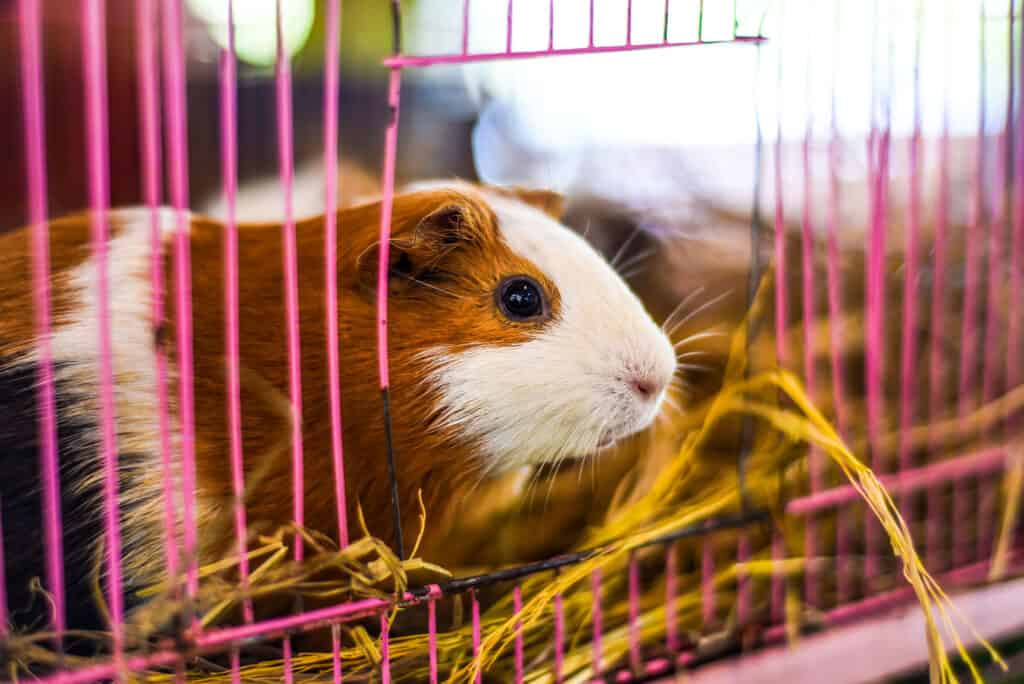
Keep your guinea pig safe with a clean living environment.
©iStock.com/Tatiana Terekhina
3. Encourage Regular Exercise
Make use of toys in your guinea pig’s living space to encourage them to exercise regularly. When you incorporate several options and rotate them, it keeps your guinea pig engaged and excited. When you can offer supervised roaming outside of their cage, this is a great option that lets them explore and play, taking advantage of the open space they don’t usually have within their enclosures.
4. Provide Chew Toys and Tunnels
Willow sticks are a good option for guinea pigs to chew on. Any plastic chew toys may present a danger in the case they were to bite a piece off and accidentally (or even intentionally) swallow it. They enjoy chewing and gnawing so by providing them with healthy outlets for these behaviors, you keep them safe from getting into other items they shouldn’t be putting in their mouths. As for tunnels, these allow guinea pigs to enjoy further enclosed hidey-hole and encourage exploration throughout their cage, keeping them curious and active.
5. Provide Warm Bedding
Dust-free hay is a must. Be sure to double-check that it’s safe to eat. Softwood products may seem attractive but they’re not good for guinea pigs. They can make them sick. Although for you, a fluffy environment sounds warm and cozy, for a guinea pig, it can present danger. These fluffy materials may separate into thin strings, which your guinea pig can get trapped in.
6. Protect Them From Environmental Dangers
Although you love all your pets, if you have cats or dogs, be sure that your guinea pig is always in a secured area where well-meaning (and mischievous) pets don’t have access. Their home should be nestled into a safe, calm, and quiet spot in your house so they’re not constantly surrounded by what they perceive as threats. It would be awful for them to be constantly stressed out, fearing for their lives in a chaotic spot in the home. They thrive when they feel safe and well cared for.
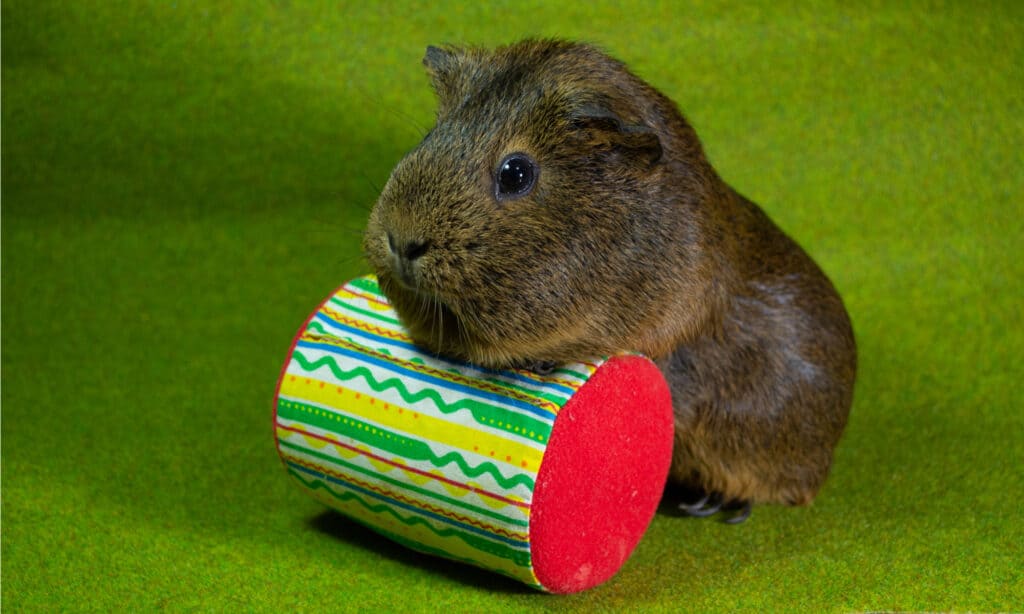
Guinea pigs need regular exercise and thrive when they feel safe.
©AnBoris/Shutterstock.com
The photo featured at the top of this post is © iStock.com/Galyna0404
Thank you for reading! Have some feedback for us? Contact the AZ Animals editorial team.




